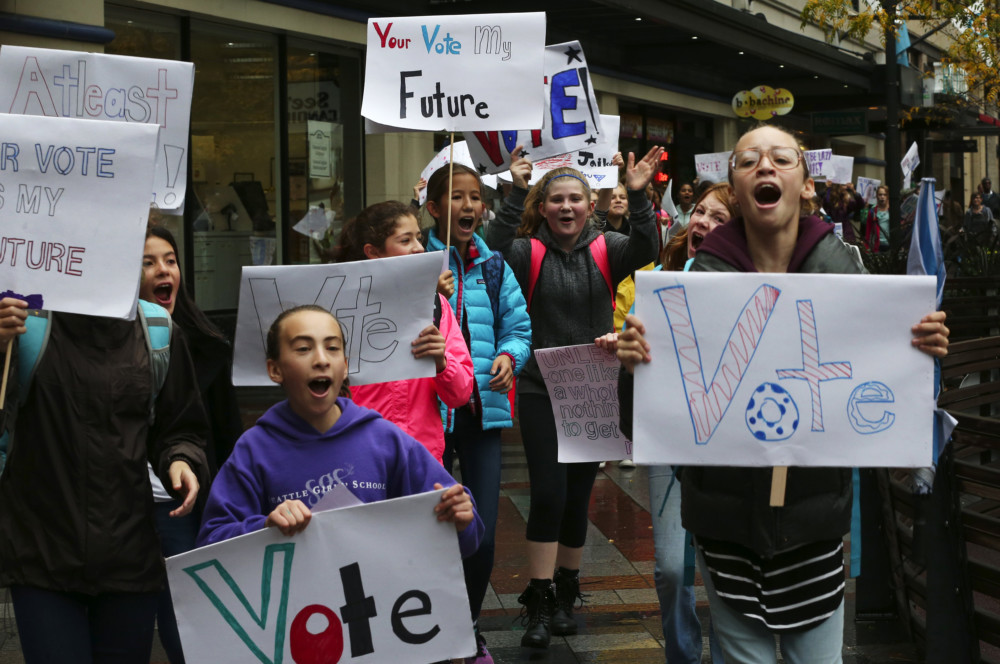By Nicole Brodeur
The Seattle Times
WWR Article Summary (tl;dr) Even though they are several years away from the voting booth, seventh grade girls from a Seattle area school took to the streets to encourage others to exercise their right to vote this election day.
SEATTLE
I’m trying to get a sense of the mind of a 13-year-old girl, I told a clutch of parents standing in Westlake Park the other morning.
“We are, too,” Jessica Dunn deadpanned. “When you find out, let us know.”
Turns out we found out together, when the seventh-grade class of Seattle Girls’ School (and these parents’ daughters) marched into Westlake Park to stand on a stage and deliver speeches urging people to vote.
Their minds were on veterans services. Climate change.
“Your vote! Our future!” the girls chanted, carrying handmade signs. They had walked the 2.5 miles from the Central District school to downtown in the rain.
And man, was I glad to see them.
The night before, the third and final presidential debate left phrases like “nasty woman,” “late-term abortion” and “I’ll leave you in suspense” hanging in the air like noxious fumes from a passing bus.
But these 12- and 13-year-old girls reminded me and everyone else at Westlake that no matter how raw and wretched things get over the next few weeks, the ending is in our hands.
Student Drew Sherrard took the stage wearing a camouflage cap and spoke of the five veterans in her family.
“Fifty-one Veterans’ Affairs facilities have scheduling problems,” she said. “When veterans have a health problem, sometimes they have to wait days or weeks for a doctor to help them through the VA system. Voting can help fix that.
“Vote!” she finished. “It’s one of the best thank-you gifts you can give someone who has served.”
Others spoke of global warming and climate change. But all urged voters to exercise their right, something they longed to do.
“When you vote, you can make your voice heard and help the issues you think are big problems in this country be solved,” said a student named Ally (who didn’t want her last name used). “That’s why voting is your responsibility.”
Reese McDowell ended her speech this way: “Our rights are like muscles,” she said. “If you don’t use them you lose them!”
Performing-arts teacher Lulu Carpenter said the students worked on their two-minute speeches for six weeks in social studies, language arts and performance classes.
“They were learning not to demonize any candidate, but to speak to the issues they care about,” Carpenter said. “Do the research, get the historical perspective.”
That done, they had to prepare to stand up in front of a crowd and deliver.
“There are some who are shy,” Carpenter said. “But all of them are prepared.”
Indeed, the girls cited voting numbers in previous elections, knew the years when women and African Americans won the right to vote and when Susan B. Anthony was arrested. They quoted from everyone from Eleanor Roosevelt to Maya Angelou.
And they got to develop their political muscle, even though they are several years away from the voting booth.
Middle-school girls have strong opinions, especially about their parents, said Kelly Cundiff, whose daughter, Dylan, 12, was one of the speakers.
But not so much when it comes to politics.
“This has helped them synthesize their thoughts,” she said, “and to know their own minds.”
This being Westlake Park, there was a man who circled the crowd on a bicycle during most of the speeches, hollering about Obama and women. No need to repeat.
Another man walked through and bellowed, “You’re supposed to vote for Bernie!”
One man holding a cardboard sign asking for money approached the girls who had lined up to speak. They swerved away from him as one.
But Luna Russell, 13, handed him a lavender flier that listed five reasons people should vote (ex: “Because you have a voice that needs to be heard”) and the address of the King County Voter Registration Annex.
“It’s not the (registration) form, though,” the man said, looking it over.
“You can register right down the street, though,” Russell said, “on Fourth Avenue.”
The man tossed the flier in the garbage, and Luna retreated. A couple of girls approached to pat her back.
Their teacher, Wendy Ewbank, stood at the side of the stage, urging each girl on and then being first to cheer when they came off the stage, relieved but energized.
Ewbank has had students research, write and deliver speeches on the importance of voting every presidential election year since 2004.
“I believe that if girls see the power of their own voices and what issues are at stake,” she said, “they will participate for the rest of their lives.”
While most of the audience was made up of the girls’ parents, those standing in line at the food trucks nearby were captive _ and happy for it.
“I’m impressed because they don’t tell anyone who to vote for,” said Wendy Lamb, an architect who works nearby. She glanced down at her lavender flier and noticed the date for Election Day. November 8.
“I’m embarrassed,” Lamb said. “I thought it was the 15th. My vote really wouldn’t have counted.”
Beside her, interior designer Melissa Fedorchenko watched the girls and thought of her own.
“It’s awesome to see them out here,” she said. “It’s like looking at the future.”
If that isn’t motivation to fill out your ballot, I don’t know what is.














































































































































































































































































































































































